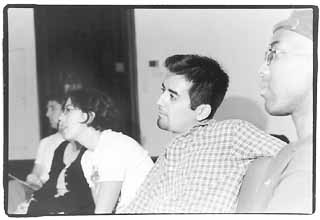Dissenting Opinion
Utilitarian Approach
By Erica C. Barnett, Fri., Nov. 6, 1998
|
|
Chief among protesters' complaints is their conviction that the current injunction, issued by U.S. District Court Judge Sam Sparks last spring, is legally binding only to the UT School of Law. Although university leaders say that the Fifth Circuit's opinion, which refers explicitly only to the law school, was meant to be interpreted broadly, students say that claim is just "hypocrisy," fueled by administrators' fear of being forced to pay monetary damages (a provision of the injunction) should the university get sued again.
One goal of activists during the upcoming series of "town hall" meetings, which begin Nov. 9 and will last into the spring, is to question administrators' commitment to affirmative action and their unwillingness to challenge Morales' interpretation of the Hopwood decision. "We don't expect these forums are going to make them reinstate affirmative action overnight. That's not our goal," says Looney. "The university is using 'diversity' as a mask to cover the fact that they're unwilling to take up this issue. ... They don't want to take a personal risk, so in a public venue they're going to have to say, 'The real reason we're doing this is to protect our asses.'"
Jim Harrington, legal director of the Texas Civil Rights Project, says the students' legal arguments are valid, even if their nuances get lost in the political shuffle. The Fifth Circuit judges' preference that Hopwood be interpreted broadly is "superfluous" to the content of the case, Harrington says. "Every lawsuit is confined to that specific case, which in this case is the law school and its admissions policies." As far as Morales' opinion is concerned, Harrington says, such opinions are essentially just "free legal advice," binding only by convention -- not by law. But in refusing to challenge the attorney general's interpretation of the decision, Harrington says, the university has left itself open to the issue of liability -- providing them with an excuse, he suggests, to claim their hands are tied.
The university puts a different spin on the issue. In his open letter to UT students in The Daily Texan, Faulkner laid out a series of legal arguments refuting students' claims. In the letter, Faulkner asserts that the Fifth Circuit's opinion is "in no way limited" to the context of the law school; that reinstating affirmative action outside the law school would "recklessly subject the university to endless litigation and the individuals involved to punitive damages"; and that diversity is "a critical issue" to the university. He also asserts in the letter that standardized testing, which student activists claim is biased against minorities, is "probably ... a very good predictor" of first-year performance in law school, "when used with other criteria."
But ultimately, students say, the problem with the dismantling of affirmative action can be read in the faces of the university's incoming classes. Since the "10% plan" took effect this year, the percentage of minority students at the school has increased only slightly; the freshman class is 2.9% black and 13.2% Hispanic; up from 2.7% and 12.6%, respectively, in 1997. (In 1996, before Hopwood took effect, 4.1% of incoming freshmen were black and 14.5% were Hispanic.)
Students say these totals, besides falling far short of the groups' representation in Texas' overall population, indicate that Hopwood is closing the doors of higher education, leaving underrepresented minorities locked outside. "Psychologically, it's going to take many generations for everyone to have the proper opportunities. ... They need to live a human life," says Sushanta Parikh, a protester and student activist. "People want to say racism is over, segregation is over, but I feel that until our culture reflects that, affirmative action is a tool to accomplish this."
Both sides will get a chance to air their arguments in the upcoming series of four town hall meetings, scheduled for Nov. 9, Nov. 16, Jan. 25, and Feb. 8. The first meeting, from 7-9 pm in UT's Jester Auditorium, will be moderated by Ted Gordon, a UT anthropology professor and proponent of affirmative action. Panelists will include Faulkner, along with university vice presidents Patricia Ohlendorf, James Vick, and James Hill; Dean of Students Sharon Justice, and Vice Provost Ricardo Romo. "We hope the administration will listen to us," says SAO member Reed. "We feel that the more information is available, the easier it will be to get our case out."
Got something to say on the subject? Send a letter to the editor.









